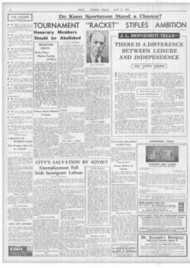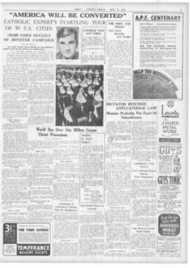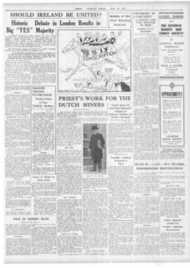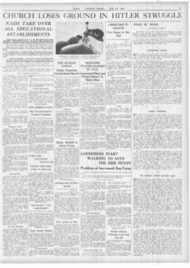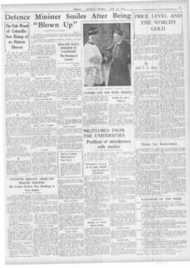Page 4, 16th June 1939
Page 4

Report an error
Noticed an error on this page?If you've noticed an error in this article please click here to report it.
Tags
Share
Related articles
'catholic Herald' Book Of The Month --±
Obituary
Scripture
Books Of The Week
Religious Books Today By Fr. Gerard Meath
" Catholic Herald" BOOK OF THE WEEK
Remedy for Neglect
VALUE AND SIGNIFICANCE OF
THE OLD TESTAMENT
The Old Testament. Cambridge Summer School Lectures, 1938. (Burns Oates and Washbournc, Ltd., 'Is. 6d.)
Reviewed by R. C. FULLER, 1I IS book is of importance and interest to all educated !atholics, and deserves a wide circulation. There are unfortunately all too few works in English which explain in handy form the Catholic view of the Old Testament. This volume of lectures contains much expert and up-to-date information secular knowledge and Catholic leaching being placed iu their right relation to each other. It is explained in the preface that at the Cambridge Summer School, " the best lecturers available treat of the most important subjects which find a place in the Catholic position." Here we find contributions from such well-known authorities as the late Archbishop Goodier, S.J., Canon Boylan, Father Lattey, 5.3., Canon Arendzen, Mgr. Barton and Father Pope, O.P., in addition to papers by scholars of a younger generation. The subjects treated range over the whole field of Old Testament study-the history of Israel, Mosaic religion, Prophecy, the Psalms, the bearing of archaeological discoveries on the Old Testament, and many other matters.
It is possible, of course, to speak here of only a few and the ones selected are not necessarily the more important. Archbishop Goodier writes in his customary, interesting way on the value and significance of the Old Testament. Here one may be allowed in passing, to pay tribute to Archbishop Goodier for the great work he has accomplished In showing us the riches contained in Holy Scripture for our spiritual life. In this respect his name may be linked with that of Canon Arendzen,
FATHER LATTEY contributes a valuable paper on the bearing of the tablets recently discovered at Ras Shamra in Syria on the Old Testament. The tablets data back to the fifteenth century B.C,, and it would be hard to exaggerate their importance for vindicating the truth of the Bible, and overturning many popular "critical" views. "I saw Wellhausen fall like lightning from heaven," says Father Lattey, " from the heaven I mean of the higher critics";
though he is careful to stress the tentative nature of many of our conclusions from these newly discovered tablets.
Roughly speaking, Wellhausen attributed practically everything in the Pentateuch that appertained to systematic religion to a single source, the " Priestly Code" which he assigned to the late sixth century s.c. Now. the Has Shamra tablets have revealed an elaborate cult which upon any dating must be earlier than Moses, so that these attempts to evolve the MORSIC system at a much later date are largely discredited. One other point may be mentioned as illustrative of the light shed on the Old Testament by these discoveries. The legend of Danel found on the tablets gives rise to the theory that he may be the famous person alluded to in Ezechiel XIV 14, 20; XXVIII 3. As Fr. Lattey points out, the name in these texts could. and probably should be read as Danel, not Daniel. Everywhere else in the Bible Daniel's name is spelt differently from these three texts. It had long been conjectured that the Danel (or Daniel) of Ezechiel was a famous character of old. distinct from the Daniel of the book of Daniel, and this conjecture has been confirmed by these discoveries.
THE unique character of Mosaic religion is well brought out by Canon Arendzen. He shows how novel was the monotheism of the Hebrews at the time Of Moses. Their idea of God, too, was widely different from the ideas of their raeighbours, for they admitted no female goddess nor tolerated any image of the One True God. Further, Canon ArendZen points out what is not always realised, that their religion, so far from being exclusively one of fear, in fact differed from pagan religions in that it admitted friendship and even love between God and His Chosen People. The almost complete absence of reference in the Old Testament to the life after death must have puzzled many. Canon Arendzen puts forward an attractive explanation. The omission is deliberate. Israel had lived for centuries in Egypt among heathens who seemed to be peculiarly well informed on the subject even to the smallest details. Israel turned away from this line of thought, and by its marked silence stood out unique among the nations. The
Israelites believed the soul survived, but professed Ignorance of the details.
Father Foster deals with historical problems of the Old Testament, sets out the principles that we as Catholics have to bear in mind, and applies them to a selected number of cases. He shows clearly and concisely the impurtance of Genesis ch. I-III for the Christian religion. His explanation of Genesis ch. I is perhaps unsatisfying and too short. but it should be remembered that the question is treated only from the historical, and not from the scientific point of view. Some convincing arguments are given that the book of Jonas is historical; and a useful bibliography is added in footnotes.
The Canon, Text and Versions of the Old Testament are treated by Father Pope, whn stresses points of special importance to Catholics. He brings out clearly the proofs for the canonicity of those books in our Old Testament which are not accepted as inspired by nonCatholics; and he gives a relatively full account of the Douay Version.
OLD Testament history is dealt with in three papers. The first of these is an outline of the history down to the end of the northern kingdom. The treatment could not of course be more than a sketch, but the important points do not stand out clearly, nor is there very much explanation, even of the most important. Thus one might have expected some explanation of the events of the Exodus, and their significance for Christianity. The chronology is disputable-but is one justified in giving 2371s.c. as the date of the arrival of the Hyksos in Egypt, and the period of their rule as 788 years?
The following paper treats of the history down to Alexander the Great. Monsignor Barton brings his learning to bear, and produces an interesting study. More Bible references would have been useful, especially where the very complicated series of events after the Exile is dealt with.
The remaining portion of the history is described by Father Jones In lively style. He stresses the chief characteristic of the period, the reaction of the Jews to the spread of Hellenism. Here, too, the sequence of events in the Books of Maccabees is not easy to follow, and some more references to chapter and verse would have helped. The latter part of the paper is rather overcrowded with facts, but perhaps this was unavoidable.
Space forbids further discussion of this interesting volume. The following misprints have been noticed-p. 107 footnote, for 1911 read 1611; p. 131, for 740a.c. read 722s.c.; p. 199, for Joachim read Joachin; p. 197, for sixth read eighth; p. 221, for Isaias XL 55 read Iss.lae, XL-LV.
blog comments powered by Disqus



